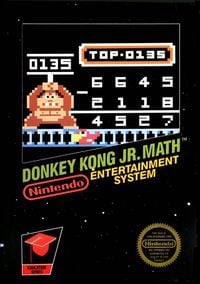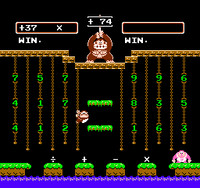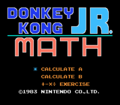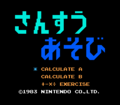Donkey Kong Jr. Math
| Donkey Kong Jr. Math | |||||
|---|---|---|---|---|---|
 For alternate box art, see the game's gallery. | |||||
| Developer | Nintendo Research & Development 2[1] | ||||
| Publisher | Nintendo | ||||
| Platform(s) | Family Computer, Nintendo Entertainment System, Virtual Console (Wii, Wii U) | ||||
| Release date | Famicom/NES: Template:Release Virtual Console (Wii): Template:Release Virtual Console (Wii U): Template:Release[?] | ||||
| Genre | Educational | ||||
| Rating(s) |
| ||||
| Mode(s) | Single player, multiplayer (up to two players) | ||||
| Input | NES:
Wii: Wii U:
| ||||
Donkey Kong Jr. Math is an educational game in the Donkey Kong series for the Family Computer released in 1983. Donkey Kong holds up a sign, and Donkey Kong Jr. must find the numbers and math sign to get to that number to get a point. A preview of this game was released as a compilation called Donkey Kong Jr. + Jr. Sansū Lesson, which included both a prototype of Donkey Kong Jr. Math and Donkey Kong Jr. a few months earlier.
Donkey Kong Jr. Math was met with negative reviews and was the worst-selling launch title for the Nintendo Entertainment System in North America. This game was recreated as an obtainable item in Animal Crossing, and it was rereleased the first time on the Virtual Console for the Wii (500 Wii Points) on September 3, 2007, and the Virtual Console for the Wii U ($4.99) in North America on August 28, 2014.
Donkey Kong Jr. Math was the only game to be released under the "Educational Series" label of North American NES titles. While Donkey Kong no Ongaku Asobi was intended to be released around the same time, it was canceled, and no other educational games in the Donkey Kong series were made.
Gameplay
The game features three modes: Calculate A, Calculate B, and +-×÷ Exercise. In Calculate A, the player controls Donkey Kong Jr. and has to move around the screen to collect numbers on the chains and mathematical symbols on the platforms to create equations whose solution matches the number shown on Donkey Kong's placard. The solution of an equation is carried over to the next equation as the first number. Aside from the number calculated from previous equations, the player can only use single-digit numbers in equations. The game is over when the player matches Donkey Kong's number five times. The gameplay of Calculate B is similar, but the player starts with a number already in their equation and negative numbers can appear on Donkey Kong's placard. Both of these modes can be played with a second player. The second player controls a pink version of Donkey Kong Jr. named Junior (II). The first to match Donkey Kong's number five times is the winner.
In +-×÷ Exercise, the player's goal is to enter the answers to ten mathematical problems in order to receive points. To insert the digits of the answer, the player has to climb up or down the chains until the desired number shows up. The player can clear all of the entered digits by pressing . The player can also push the question mark to the keyhole to show the correct solution, though this does not give the player any points. Up to 100 points are given for each problem with points being deducted for answering incorrectly and taking too long to answer. The player can earn a maximum of 1,000 points. The following problem types are available in this mode:
- Adding two two-digit numbers
- Subtracting two three-digit numbers
- Adding two four-digit numbers
- Subtracting two four-digit numbers
- Multiplying two one-digit numbers
- Adding two six-digit numbers
- Subtracting two six-digit numbers
- Multiplying a three-digit number by a two-digit number
- Dividing a two-digit number by a one-digit number
Characters
Playable
Non-playable
Nintendo eShop description
Learning can be fun, especially when you play along with Donkey Kong Jr.!
Practice addition, subtraction, multiplication, and division by directing Junior, a cute little monkey, who must climb up and down vines to collect numbers and symbols in order to solve the math problems his father gives him.
Compete with a friend in a race to solve problems in Game A, or add more challenge with Game B. Of course, you can also practice on your own!
This game is perfect for younger players who are looking for a fun and easy way to develop their math skills!
Gallery
Logo/artwork
Sprites
Screenshots
Box art/Virtual Console icon
Media
| File info 0:12 |
| File info 0:30 |
| File info 0:05 |
| File info 0:06 |
References to other games
- Donkey Kong Jr. – The game's cast, its setting, and many of its graphical elements are reused from the NES version of its predecessor. Calculate A and B's setting resembles the Jump Board Scene and +-×÷ Exercise's setting resembles the Chain Scene. In fact, the game's ROM image was copied and hacked directly from Donkey Kong Jr., as evidenced by the presence of unused Donkey Kong Jr.-exclusive graphics in the ROM, among other things.[2]
References in later games
- Donkey Kong Country Returns – Donkey Kong's sprite while holding a sign is reused as a background element in Wonky Waterway.
- Super Smash Bros. Melee - Donkey Kong Jr.'s trophy mentions that one of his skills was in mathematics, alluding to this game.
- Super Smash Bros. for Nintendo 3DS / Wii U – Donkey Kong's pink alternate costume is similar to Junior (II).
Names in other languages
| Language | Name | Meaning | Notes |
|---|
External links
References
- ^ Iwata, Satoru et al. Iwata Asks: New Super Mario Bros. Wii. Nintendo of America. Retrieved June 1, 2024.
- ^ Donkey Kong Jr. Math. The Cutting Room Floor. Retrieved April 4, 2015.
| show Donkey Kong games |
|---|
| showFamily Computer / Nintendo Entertainment System games |
|---|
| show Virtual Console games |
|---|











